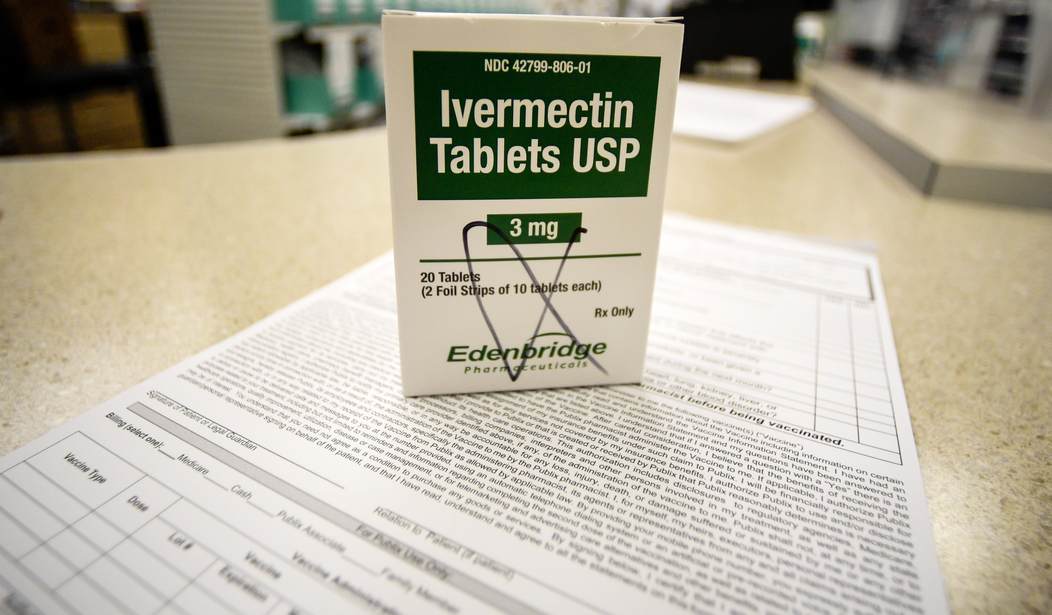The Department of Health and Human Services threw in the towel last Thursday when defending the FDA's and CDC's campaign to discredit Ivermectin as a therapeutic drug for the mitigation of COVID symptoms and to restrict the ability of doctors to prescribe the drug for off-label use.
Plaintiffs Drs. Paul Marik, Mary Bowden, and Robert Apter allege that the guidance and public information put out by HHS's subordinate agencies interfered with their ability to practice medicine. In the case of Dr. Marik, their statements caused him to lose employment while Dr. Bowden's medical license is under attack. They are just the tip of the iceberg of physicians subjected to professional damage because they elected to use their professional judgment and clinical experience for patient care rather than FDA tweets.
Background
Ivermectin is a drug used to treat various diseases and conditions. During the COVID panic, some doctors began prescribing it as a therapeutic for COVID. Several of the doctors were highly regarded medical professionals. The use of the drug was controversial, and the studies have been inconclusive in terms of benefits. For some reason that can only, at this point, be explained by conjecture on our part, the federal government engaged in an overt information campaign to discourage doctors from prescribing the drug. The campaign had an indirect side-effect of discouraging pharmacies from filling prescriptions.
You are not a horse. You are not a cow. Seriously, y'all. Stop it. https://t.co/TWb75xYEY4
— U.S. FDA (@US_FDA) August 21, 2021
Hold your horses, y'all. Ivermectin may be trending, but it still isn't authorized or approved to treat COVID-19. https://t.co/TWb75xYEY4
— U.S. FDA (@US_FDA) April 26, 2022
Drs. Paul Marik, Mary Bowden, and Robert Apter first brought the lawsuit n 2022 in the Southern District of Texas. Their contention was that the CDC and FDA are not allowed to give medical advice, and the public information campaign carried out by those agencies crossed the line from information to setting medical policy for doctors and pharmacies.
Their suit was dismissed by U.S. District Judge Jeffrey Brown, a Trump appointee. The government defended its actions by saying:
"The cited statements were not directives. They were not mandatory. They were recommendations. They said what parties should do. They said, for example, why you should not take ivermectin to treat COVID-19. They did not say you may not do it, you must not do it. They did not say it's prohibited or it's unlawful. They also did not say that doctors may not prescribe ivermectin," Isaac Belfer, one of the lawyers, said during a Nov. 1 hearing in federal court in Texas.
"They use informal language, that is true. It's conversational but not mandatory."
Judge Brown ruled:
First, while § 396 limits the FDA’s powers as applied to medical devices, it does not do so in the context of drugs. As there is no statute limiting the FDA’s actions here, it cannot have acted outside of any statutory limitations. Further, it cannot be said that the FDA had no colorable basis of authority. The FDA is charged by Congress with protecting public health and ensuring that regulated medical products are safe and effective, among other things.
The plaintiffs do not dispute that the FDA has the authority, generally, to make public statements in-line with these purposes. Although the FDA could have, and perhaps should have, been more prudent in their communications, they had at least a colorable basis in authority—and there is no statute saying otherwise.
Basically, as the government had taken no action to enforce its opinion, it was free to say whatever it wished, no matter how those statements were used to penalize doctors who differed with that opinion.
The plaintiffs appealed to the Fifth Circuit. Fortunately, that court took the case. The panel hearing the case is Circuit Judge Jennifer Walker Elrod (Bush 43 appointee) and Circuit Judges Edith Brown Clement (Bush 43 appointee and Don Willett (Trump appointee). (The video is cued to the relevant segment.)
The line the plaintiffs are pushing isn't hard to understand.
“The fundamental issue is straightforward,” the challengers’ attorney Jared Kelson of the Washington firm Boyden Gray & Associates began.
“After the FDA approves a human drug for sale, does it then have the authority to influence or interfere with how that drug is used within the doctor-patient relationship? The answer is no,” he added.
Kelson said the fact that these physicians are prescribing ivermectin off-label — for different purposes than the FDA has approved — makes no difference because federal law bars anything that would even deter off-label use, evidenced by the fact that nearly 40% of all U.S. prescriptions are for off-label use.
“That’s a bright line the FDA cannot cross,” Kelson stated.
And if an agency's influence results in a patient being unable to fill a legal prescription or in a doctor losing employment or their license, then the government isn't giving advice, it is making policy.
In the hearing, government lawyers tried the same rope-a-dope that had worked so well on Judge Brown.
But Justice Department attorney Ashley Honold argued that line between lawful FDA guidance on drugs and unlawful interference with doctors’ prescribing practices is not as clear-cut as the plaintiffs contend.
She characterized the agency’s ivermectin warnings as informational statements, and stressed they are not regulations, they have no legal consequences, and they don’t bar doctors from prescribing ivermectin to treat Covid or for any other purpose.
Based on the limited information available, it doesn't seem like the Fifth Circuit panel was buying what the government was selling.
U.S. Circuit Judge Don Willett, a Trump appointee, pressed Honold to define the limits of the FDA’s jurisdiction.
“You concede the FDA has no authority to issue medical advice, correct? That is not arguable, right? The FDA cannot issue medical advice,” he said.
SPOILER ALERT: the correct answer is "yes."
“No, your honor,” Honold replied. “The government is not conceding that in this case.”
She said when people are using drugs in unsafe ways, leading to hospitalizations, it “is not only permissible, it is imperative that the FDA be able to inform the public of its scientific views about safe uses of drugs.”
For example, Honold said, the FDA recently issued advisories warning people it is not safe to eat chicken cooked in the cough syrup NyQuil — a recipe that spread on the social media app TikTok. And in 2014, Honold noted, the FDA cautioned against using lidocaine off-label as a numbing agent for teething babies because it can cause seizures and deaths for them.
According to Honold, "FDA made these statements in response to multiple reports of consumers being hospitalized, after self-medicating with ivermectin intended for horses, which is available for purchase over the counter without the need for prescription." Were that true, one would have thought FDA would have spelled it out once it became clear how the message was being interpreted.
Where Honold loses the plot is that highly credentialed doctors are not the same as a TikTok video. And in the case of lidocaine use, it was commonly prescribed and had been linked to a small number of deaths and injuries. That is hardly the case for ivermectin. Judge Elrod, brought the smoke.
“What about when it said, ‘No, stop it’?” Circuit Judge Jennifer Walker Elrod, on the panel that is hearing the appeal, asked. “Why isn’t that a command? If you were in English class, they would say that was a command.”
Ms. Honold described the statements as “merely quips.”
“Can you answer the question, please? Is that a command, ‘Stop it’?” Judge Elrod asked.
“In some contexts, those words could be construed as a command,” Ms. Honold said. “But in this context, where FDA was simply using these words in the context of a quippy tweet meant to share its informational article, those statements do not rise to the level of a command.”
The left, particularly the Government Media-Compliant-Fact Checker complex is trying to minimize the case as "nothing to see here." For instance, in this one from FactCheck.org we see the point clearly, deliberately being missed; FDA Did Not Change Position on Ivermectin Use, Contrary to Online Claims. The issue in the lawsuit is how the FDA's "advice" was packaged to look and sound like medical advice. And, indeed, the government stating in court that it has no objection to doctors using ivermectin off-label is a huge climb-down from FDA's public messaging during COVID.













